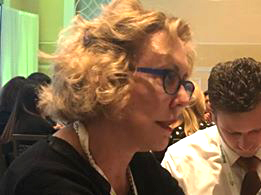PPMD Marks 10th Year of Duchenne Registry, Largest Repository of DMD Patient Data

The Duchenne Registry, formerly known as DuchenneConnect, marks its 10th anniversary as the world’s largest repository of patient-reported data on Duchenne muscular dystrophy (DMD): 4,200 people from more than 100 countries with both DMD and Becker muscular dystrophy.
A member of the Treat NMD-International Neuromuscular Network, the registry began in May 2007 and was launched exactly one year later by Parent Project Muscular Dystrophy, a nonprofit group founded by Pat Furlong and based in Hackensack, New Jersey.
Furlong spoke to Muscular Dystrophy News Today during last month’s 2018 World Orphan Drug Congress in Oxon Hill, Maryland. She said her group, which has an $9 million annual budget, has always financially supported the registry because of its importance to patients.
“When we started PPMD in 1994, the mean age of death was still in the late teens. Since then, we’ve seen a 10- to 15-year increase in life spans, with care optimization being the biggest reason for this result,” she said, noting that the very act of collecting data heightens awareness of the need for such data.
“And because caregivers know a registry exists, they will talk about that registry to others,” she said. “So you begin to build on that, and then people share ideas. That’s where you begin to ask really terrific questions.”
Pharmaceutical companies often request data of use in identifying clinical trial sites, Furlong said, and some “ask us for specific criteria to identify a cohort of individuals that could be candidates. We have also done recruitment through that network.”
The registry, which also includes female carriers, is widely considered the go-to patient registry for researchers and clinical investigators, PPMD said in a press release.
“When families join and update their account in The Duchenne Registry, they are strengthening the power of a 10-year-old network of patient-powered data that will be used to improve care for people living with Duchenne and increase understanding of the disorder,” said the registry’s director, Ann Martin. “Families become citizen scientists by contributing to real scientific research, without ever leaving their homes.”
The registry now has 17 industry partners and has helped recruit for about 60 clinical trials. Its data has appeared in seven publications, with three more publications pending. It’s also been selected as one of the few Patient-Powered Research Networks in PCORnet, the National Patient-Centered Clinical Research Network. The Duchenne Registry has had that status within PCORnet for both Phase 1 and 2 studies since 2014.
“This registry is really important to really understand if your child has a new diagnosis, and the doctor is giving you the prognosis of what the trajectory of this disease is,” Furlong said. “For example, how many boys are on steroids? How many are taking supplements or heart medicine? This is some of the data that’s being collected.”
About 80 percent of those on the registry live in the United States, and about 10 percent of the total are girls and women. It also includes adults with Duchenne, said Furlong, adding that she knows of patients now in their 40s.
“Starting a registry really creates this environment of understanding data, and the willingness to apply known medical tools to improve patients’ quality of life while treatments are being developed,” she said. “As these tools are applied and people use ventilation and steroids, all this is evolving the natural history of the disease, so they’re living longer and more quality lives.”







